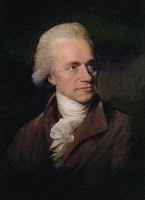 Last week, Megan posted about birthday parties. We’re about to celebrate my oldest’s, and having it a local observatory, the Kopernik Space and Education Center.
Last week, Megan posted about birthday parties. We’re about to celebrate my oldest’s, and having it a local observatory, the Kopernik Space and Education Center.
Did you know there was an important woman astronomer during the Regency? Caroline Herschel was born in Germany, in 1750. She accompanied her brother, William Herschel, to England, to serve as his housekeeper and also his assistant, and continued to study the stars until her death in 1848.
I found this letter from Caroline to her sister and thought I’d share.
William is away, and I am minding the heavens. I have discovered eight new comets and three nebulae never before seen by man, and I am preparing an index to Flamsteed’s observations, together with a catalogue of 560 stars omitted from the British Catalogue, plus a list of errata in that publication.
William says I have a way with numbers, so I handle all the necessary reductions and calculations. I also plan every night’s observation schedule, for he says my intuition helps me turn the telescope to discover star cluster after star cluster.
I have helped him polish the mirrors and lenses of our new telesope. It is the largest in existence. Can you imagine the thrill of turning it to some new corner of the heavens to see something never before seen from earth? I actually like that he is busy with the Royal Society and his club, for when I finish my other work I can spend all night sweeping the heavens.
Sometimes when I am alone in the dark, and the universe reveals yet another secret, I say the names of my long lost sisters, forgotten in the books that record our science:
Aganice of Thessaly,
Hyptia,
Hildegard,
Catherina Hevelius,
Maria Agnesi,
–as if the stars themselves could remember. Did you know that Hildegard proposed a heliocentric universe 300 years before Copernicus? That she wrote of universal gravitation 500 years before Newton? But who would listen to her? She was just a nun, a woman.
What is our age, if that age was dark? As for my name, it will also be forgotten, but I am not accused of being a sorceress, like Aganice, and the Christians do not threaten to drag me to church, to murder me, like they did Hyptia of Alexandria, the eloquent young woman who devised the instruments used to accurately measure the position and motion of heavenly bodies.
However long we live, life is short, so I work. And however important man becomes, he is nothing compared to the stars. There are secrets, dear sister, and it is for us to reveal them. Your name, like mine, is a song.
Write soon
–Caroline
Doesn’t she sound like someone we’d like to meet? I would love to tell her that in our day, there are little girls who think it’s cool to celebrate a birthday at an observatory. I think it would make her smile.
Elena
LADY DEARING’S MASQUERADE, RT Reviewers’ Choice Award, Best Regency Romance
www.elenagreene.com






